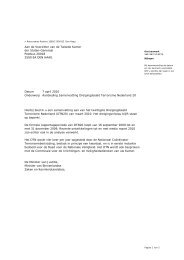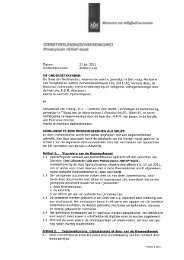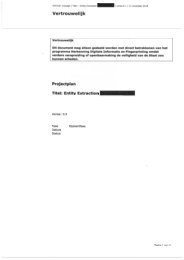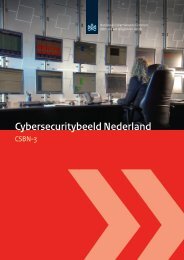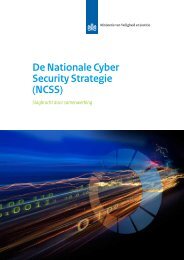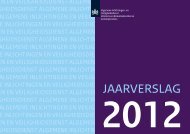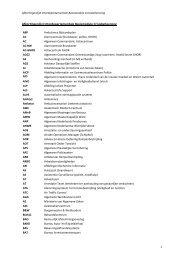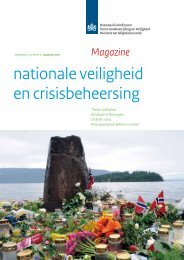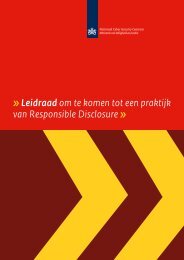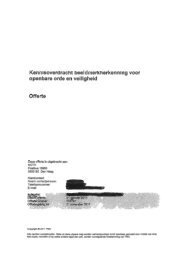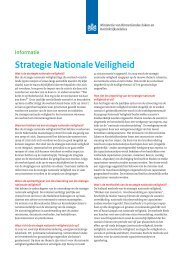third Cyber Security Assessment Netherlands - NCSC
third Cyber Security Assessment Netherlands - NCSC
third Cyber Security Assessment Netherlands - NCSC
You also want an ePaper? Increase the reach of your titles
YUMPU automatically turns print PDFs into web optimized ePapers that Google loves.
ACM seeks active collaboration with (inter)national public and<br />
private parties. Legal judgments from spam investigations in 2012<br />
[38: OPTA 2013]<br />
can be found in the ACM annual report 2012.<br />
Responsible disclosure introduced<br />
Responsible disclosure in the IT world means responsibly, and jointly<br />
between the reporter and the organisation, making IT vulnerabilities<br />
public on the basis of relevant policy put together by organisations.<br />
[32: <strong>NCSC</strong> 2013-1] Applying responsible disclosure can very much help<br />
to increase the security of information systems and (software)<br />
products. In 2013, the guideline for arriving at a practice for<br />
[32: <strong>NCSC</strong> 2013-1]<br />
responsible disclosure in the <strong>Netherlands</strong> was published.<br />
This is a handout for organisations and reporters as to how<br />
vulnerabilities in information systems and (software) products can<br />
be reported and dealt with in a responsible manner. It is now down<br />
to organisations to implement and publish their own responsible<br />
disclosure policy. The <strong>NCSC</strong> received the first reports at the<br />
beginning of 2013 but it is still too early to draw any conclusions.<br />
5.8 <strong>Cyber</strong> operations in the Defence sector<br />
In June 2012, the Minister of Defence issued the Defence <strong>Cyber</strong><br />
Strategy containing six focal points. The focal points for Defence<br />
are a comprehensive approach, strengthening of digital resilience<br />
(‘defensive’), the military capacity to carry out cyber operations<br />
(‘offensive’), increased cyber intelligence capacity, adaptive and<br />
innovative capability and collaboration. [93] The Ministry of Defence<br />
(MoD) is expanding its cyber capacities to safeguard deployment<br />
of the Dutch armed forces and increase the efficiency of this<br />
deployment. The priority is to increase the MoD’s own resilience<br />
and strengthen the intelligence position.<br />
In 2012, a <strong>Cyber</strong> Task Force was formed to facilitate this intensification.<br />
A start was also made in expanding the capacity of the Defence<br />
Computer Emergency Response Team (DefCERT) and the Defence<br />
Intelligence and <strong>Security</strong> Service (MIVD). At the same time, there is<br />
closer collaboration with the <strong>NCSC</strong> and other partners. To increase<br />
internal awareness, various learning environments have been<br />
introduced and there has been participation in various cyber drills.<br />
Furthermore, the taskforce will establish the capability to apply<br />
cyber in military operation (including offensive capacity). To achieve<br />
this, the Defence <strong>Cyber</strong> Command and the Defence <strong>Cyber</strong> Expertise<br />
Centre (DCEC) are being set up.<br />
DefCERT supervises protection of the defence networks. DefCERT’s<br />
current capacity is being expanded with specialists in ICS and<br />
Process Control or SCADA systems. This marks an important step<br />
in increasing the protection of arms and sensor systems.<br />
93 Defence <strong>Cyber</strong> Strategy, June 2012.<br />
94 Washington, Beijing in <strong>Cyber</strong>-war Standoff, Newsline ABC, 12 February 2013.<br />
95 The other four domains are: air, sea, land and space.<br />
96 <strong>Cyber</strong> Crime and <strong>Cyber</strong> War Predictions, <strong>Cyber</strong> Defense Magazine, 25 March 2013.<br />
The MIVD investigates all actors who pose a cyber threat to the Dutch<br />
armed forces and the defence industry. The MIVD is reinforcing its<br />
information position in the cyber domain with the aim of detecting<br />
and combating digital attacks from (potential) opponents. In doing<br />
this, the MIVD is helping to combat cyber threats with the aim of<br />
guaranteeing the Dutch armed force’ readiness for deployment and<br />
action. Given its expertise and special legal competences, the MIVD,<br />
working with the Defence <strong>Cyber</strong> Command, plays a crucial role<br />
in developing the defence sector’s offensive cyber capacities.<br />
In addition, project Symbolon is to be rolled out together with<br />
the General Intelligence and <strong>Security</strong> Service (AIVD), as part of<br />
which both intelligence services will bundle their cyber and SIGINT<br />
capability into one joint unit.<br />
Within the given mandate, offensive cyber capabilities will be used<br />
by the Defence <strong>Cyber</strong> Command under the responsibility of the Chief<br />
of Defence (CDS). By 2015, the armed forces must be in a position<br />
to deploy offensive cyber capabilities in military operations.<br />
Defence is furthermore involved in the National <strong>Cyber</strong> <strong>Security</strong><br />
Research Agenda, various NATO and EU programmes and<br />
the Cooperative <strong>Cyber</strong> Defence Centre of Excellence (CCDCoE)<br />
in Tallinn. In preparation for the establishment of a professorship<br />
in 2014, an Associate Professor of <strong>Cyber</strong> Operations was appointed<br />
to the MoD’s Dutch Defence Academy in 2012.<br />
Digital warfare and cyber conflicts<br />
States are not only active in cyberspace to defend themselves,<br />
they are increasingly developing intelligence and offensive<br />
cyber capabilities. Every day, states carry out digital surveillance<br />
on computer networks for reconnaissance and/or<br />
offensive purposes.<br />
The media are firmly instilling fear of a cold war in the digital<br />
domain [94] In reality, digital resources are another weapon<br />
in the arsenal that a state already has at its disposal. The<br />
deployment of digital resources is relatively easy given the<br />
degree of anonymity and because developing and deploying<br />
digital resources is simpler and cheaper than conventional<br />
weapons. Political and military conflicts already take place<br />
partially in cyberspace and comprise the same elements as in<br />
the physical world, including propaganda, espionage, surveillance<br />
and targeted attacks. The Dutch armed forces therefore<br />
consider cyberspace to be the fifth domain. [95]<br />
Conflicts (partially) fought out in the digital domain may<br />
present an additional threat if there is a large-scale spill-over<br />
to civil society. After all, offensive cyber capabilities may<br />
be deployed through vulnerabilities on private and business<br />
computers, and on mobile devices. [96] Furthermore, with<br />
a targeted cyber attack it is in theory possible to bring about<br />
harm to a country remotely, for example by infecting the<br />
SCADA systems.<br />
40



